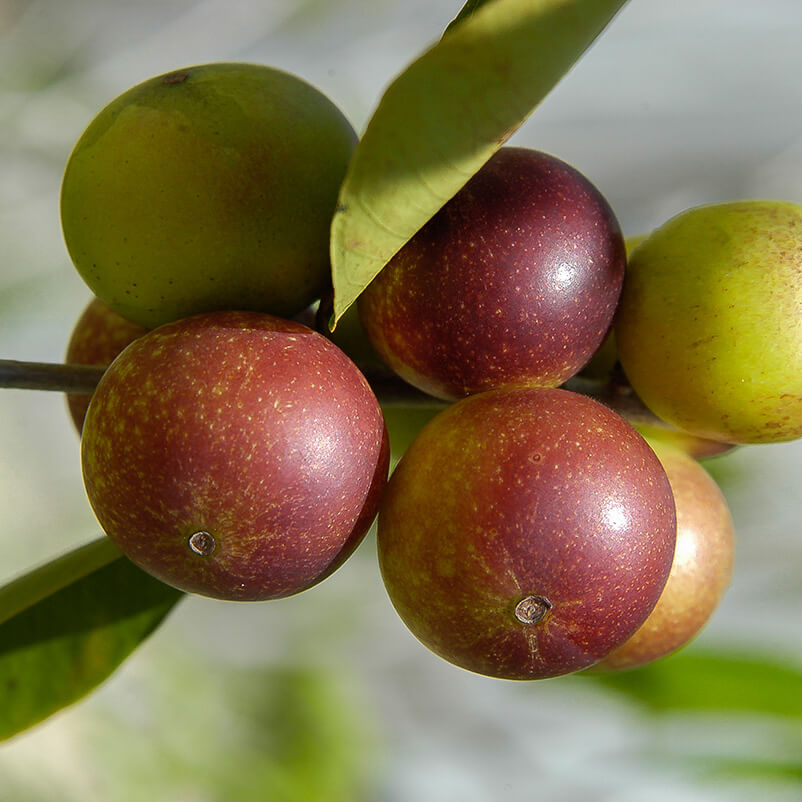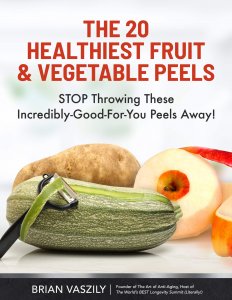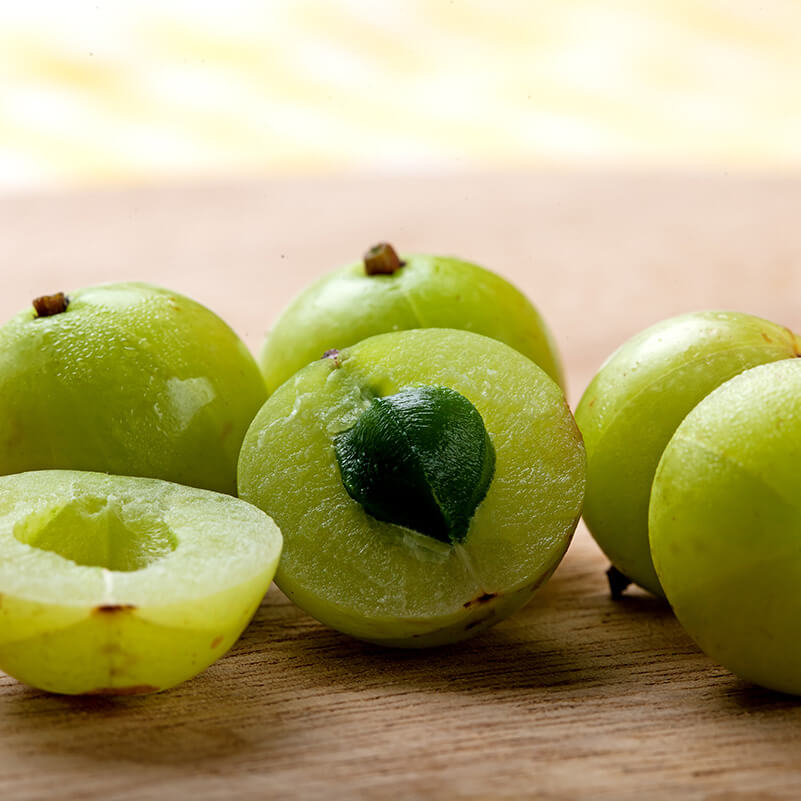There are two primary proteins in your skin involved in keeping it healthy and young-looking: collagen which gives skin firmness, and elastin which keeps skin tight.
While other ingredients, most notably red maple leaf extract, are ideal for boosting the elastin, vitamin C may be the superstar amongst the stars for boosting collagen.
And that’s just one of its benefits!
Below are all five of the top vitamin c benefits for the skin.
Following that are five of the most potent natural vitamin C ingredients to look for on labels.
Top 5 Vitamin C Benefits for Skin
1) Boosts Collagen Production
Collagen is most definitely a skincare buzzword these days and with good reason. It’s the most abundant protein in your body and responsible for about 70% of your skin’s makeup. (1)
Without enough collagen, your skin starts to get the fine lines and wrinkles we associate with age. It also loses plumpness and thickness, causing thin and sagging skin.
Unfortunately, collagen production naturally decreases as you age. Other factors like smoking and sun damage can likewise be detrimental to collagen. (2)
The good news is that low collagen levels can be reversed, and vitamin C is a huge catalyst for this. Multiple studies have shown its ability to boost collagen production by promoting collagen synthesis, meaning it helps your body actually make more collagen. (3)
This, in turn, will help your skin rejuvenate and become firmer in appearance.
There’s also some evidence that boosting collagen production by using topical vitamin C can increase skin thickness. (4) Thin skin is another telling sign of collagen loss and is more prone to developing wrinkles.
2) Helps Brighten Skin and Fades Hyperpigmentation
Skin can become dull and lose its healthy glow for many reasons. Environmental factors, lack of sleep, and plain old stress all contribute to less-than-radiant skin.
You’ve also likely noticed some form of hyperpigmentation develop on your face over the years. Hyperpigmentation just refers to spots where a substance called melanin is overproduced.
Melanin is a dark pigment that naturally occurs in skin. You’re probably most familiar with it in regard to tanning. Skin gradually increases its melanin pigment on exposure to sunlight to prevent sun damage. (5)
Typically, the melanin fades when you stop going out in the sun (during winter for example).
Unfortunately, you can also develop age spots or sun spots where melanin doesn’t fade away and skin remains dark. Areas of skin where acne has healed can likewise become hyperpigmented, leaving dark spots that stand out.
Of course, you can cover these spots with makeup, but vitamin C has proven benefits for actually brightening skin tone andfading hyperpigmentation.
Studies have shown that vitamin C impedes melanin production, which can decrease pigmentation. (6) This means that topical application can help to fade dark spots on your skin and give you an overall brighter complexion.
3) Reduces Redness and Evens Out Skin Tone
Red and inflamed areas of skin can be challenging to deal with and a blow to your self-confidence.
Inflammatory skin conditions like acne, eczema, and rosacea are becoming more common. Even if you don’t deal with one of these, it’s likely you still get red and irritated patches of skin from time to time because of stress, harsh weather, etc.
Vitamin C is an antioxidant and has powerful benefits for irritated and inflamed skin because of its anti-inflammatory properties. (7)
Its anti-inflammatory activity is strong enough that it’s been used to treat conditions like acne, and it also has benefits for smoothing and evening out skin tone. (8) You can use vitamin C regularly to reduce redness for a better, healthier complexion.
Your skin will likely feel healthier and less irritated, too!
4) Combats Many Signs of Aging
You’ve already learned about how vitamin C can fight wrinkles and fine lines by boosting collagen production, but it doesn’t stop there.
Many signs of premature aging on your skin come from sun damage. Even with the best intentions, most of us spend at least some time out in the sun without any protection. This leads healthy skin cells to suffer UV damage from free radicals.
Free radicals speed up aging in the skin and cause photodamage at the cellular level. (9)
The best way to combat free radicals and reverse damage is with antioxidants, which is exactly what vitamin C is. Antioxidants protect skin cells and essentially neutralize free radicals. (8)
Regular topical use of vitamin C helps your skin recover from premature aging and sun damage, giving it a more youthful and radiant appearance. Because antioxidants work at the cellular level, your skin is getting deep benefits even as it starts looking better on the surface.
Wrinkles, age spots, and sagging skin will noticeably start to improve.
5) Protects Your Skin from Further Damage
The only thing better than helping your skin rejuvenate and recover its youthful appearance is shielding your skin from more damage.
Vitamin C benefits your skin not only by renewing your complexion but also by protecting skin cells, especially from harmful UV rays. Its powerful antioxidant properties can stop free radical formation before it even starts. (8)
While topical vitamin C is not a substitute for sunscreen, the addition of it to your regimen gives you yet another barrier against premature aging.
Also, because it naturally promotes collagen production, vitamin C helps your skin to regenerate itself, stopping fine lines and wrinkles before they even show up.
Vitamin C is truly one of the best ingredients for renewing and maintaining healthy, youthful-looking skin.
5 Best Vitamin C Skincare Ingredients
Just because a skincare product has vitamin C listed as an ingredient doesn’t automatically make it great for your skin.
The source of vitamin C matters as do the other ingredients in the product. You don’t want to be putting any toxic chemicals or synthetic ingredients on your skin that may cause more harm than good.
Vitamin C (also called ascorbic acid) is commonly derived from corn, much of which is GMO. Other vitamin C derivatives are either less effective or are unstable and easily degrade. (10)
Choosing natural and whole-food sources of vitamin C is great for your skin and makes for a stable, effective product.
Because virtually ALL cosmetics contain toxic and synthetic ingredients, even so many that advertise themselves as “organic,” please look closely at labels and always choose “USDA Certified Organic” (or your country’s equivalent if outside the USA). This ensures it went through strict verification — independent of the company — to ensure it is truly toxin-free.
Here are 5 of the best vitamin C ingredient choices to look for:
1) Camu Camu
Camu camu (Myciaria dubia) is a tart, cherry-sized fruit that comes from the Amazon rainforest. It’s one of the richest vitamin C sources in the world, surpassing acerola cherries and second only to the little known kakadu plum. (11)
Extracts of camu camu provide even more vitamin C power because of their concentrated nature.
Besides vitamin C, camu camu also has other powerful antioxidants, including flavonoids and carotenoids that protect your skin and fight signs of aging. (12) Its use as a skincare ingredient is relatively new but is gaining quickly in popularity.
If you’re looking for vitamin C benefits for your skin, it’s hard to beat camu camu.
2) Acai Berries
You might remember when acai berries shot to popularity as a superfood. They still remain a nutrient-packed health food, but other super-fruits have popped up to share the spotlight.
Acai berries also hail from the rainforests of Central and South America. These tiny purple berries are packed with nutrients and antioxidants that are good for your body and your skin.
While acai does not have the same high vitamin C content as camu camu (it has about the same amount as blueberries), it’s one of the richest sources of antioxidants. The pulp has the highest concentration of antioxidants and also exfoliates skin. (13)
The berries are rich in vitamin A, another anti-aging nutrient, which combines with vitamin C to brighten skin and boost collagen production.
3) Mango Seed Butter
Mango butter is the natural fat extracted from mango seeds and is similar in consistency to shea butter. Mangos themselves are packed with vitamin C and so is the butter.
It’s also rich in vitamin A, vitamin E, antioxidants, and fatty acids that all work together to moisturize, smooth, firm, and brighten skin.
Vitamin E is an antioxidant (like vitamin C) and helps to protect skin from sun damage, preventing dark spots and wrinkles from forming. In fact, it’s been shown that vitamin C used in conjunction with vitamin E provides better protection than just one vitamin alone. (8)(14)
This makes mango butter a skincare powerhouse for hydrating, protecting, and improving skin health.
4) Rosehip Oil
Rosehips are the fruit (technically the pseudo fruit) of the rose plant. They form in late summer and are ready to pick when the flower petals start falling off. Rosehips also happen to be one of the most nutrient-dense foods in the world.
They contain about 200% of the recommended daily value of vitamin C, plus vitamin A, vitamin E, and antioxidants. (15)
Rosehip oil (also called rosehip seed oil) is a prized skincare ingredient that harnesses the power of vitamin C for brightening skin and fighting signs of aging. It’s also full of fatty acids that hydrate your skin while improving elasticity. (16)
If you’re looking for a lightweight, moisturizing form of vitamin C, rosehip oil might be your go-to.
5) Indian Gooseberry
Indian gooseberry (Phyllanthus emblica) is a fruit that has been used in Ayurvedic medicine for thousands of years. It also goes by the names of amla and amalaki.
Indian gooseberry has an extremely high vitamin C content- about 20-30 times that of oranges! (17) It’s full of antioxidants and other nutrients, making it a central ingredient in several Ayurvedic health preparations.
This “new” super-fruit is still gaining traction in skincare but so far has been proving its worth. Indian gooseberry extract can work wonders for your skin by giving it a firmer, tighter, and more youthful appearance.
Treat your skin to a healthy dose of vitamin C with this small but mighty berry.
Is Your Skin Getting Its Daily Vitamin C?
 Purity Woods’ #1 bestselling Age-Defying Dream Cream feeds your skin nature’s most potent ingredients for your collagen, such as Indian Gooseberry, Camu Camu, and Mango Seed Butter — along with nature’s other finest ingredients for your skin’s elastin, moisture and hydration, and more!
Purity Woods’ #1 bestselling Age-Defying Dream Cream feeds your skin nature’s most potent ingredients for your collagen, such as Indian Gooseberry, Camu Camu, and Mango Seed Butter — along with nature’s other finest ingredients for your skin’s elastin, moisture and hydration, and more!
That means the Age-Defying Dream Cream eliminates the appearance of fine lines, wrinkles, age-spots, loose-looking skin, uneven skin tone and more like nothing else available — which is why it’s a #1 bestseller!
PLUS, it’s fully USDA Certified Organic, so you don’t need to worry about feeding your skin (and therefore your body) any harmful ingredients that can work against your health.
If you’re ready to discover the many benefits of this powerful solution that is safe for sensitive skin and won’t clog your pores, consider the bestselling USDA Certified Organic Age-Defying Dream Cream from Purity Woods.
Find out more here right now, including today’s special offer… your skin will definitely thank you!



Its hard to find knowledgeable people on this topic, but you sound like you know what youre talking about! Thanks
Very informative article. Many think of vitamin C in terms of respiratory health (fighting colds and flu) but few connect it to having healthy skin and slowing the signs of aging.
Good information, thank you. I will get these items into my arsenal!!
My husband is trying camu camu to hopefully help eczema.
Where can I find organic camu camu in a liquid form so that I can apply it to my face? I see lots of powders, etc. I’ve ordered the Dream Cream and am awaiting its arrival. Thank you.
I have been using your products almost 2 years. They are clean, and refreshing. I like the simplicity using them. My skin stays hydrated and moist. Just moved from a rainy climate to a high desert…my facial skin has not suffered in the transition. I am 72…i just want to take good care of my skin the simplest and most affordable way i can..
Your priducts seem to be helping me to do that, thank you.
thank youvvery much for this illuminating information.
I would recommend the book “Why Animals Don’t Get Heart Attacks—But People Do!” by Dr. Matthias Rath, graduate of Hamburg University Medical School, who worked with Nobel laureate Dr. Linus Pauling on vitamin-C research. The name of the book comes from the fact that most of the animals make their own vit C, and that bears in the wild for example have cholesterol levels of 400-600 and yet don’t have heart problems. He goes into the matter mentioned in the article above about vit C being needed to synthesize collagen, and that without it, coronary arteries, more than arteries in other parts of the body because of the pressure peaks produced right there with each beat of the heart, crack, and the resulting inflamation and the body’s efforts to patch the cracks until the dietary deficiency is corrected play a part in causing heart attacks. Further however, the loss of cell-wall strength, resulting from a lack of vit C, can cause many other problems. There’s evidence that thousands of years ago, humans used to make their own vit C also, in huge quantities of tens of thousands of milligrams per day, maybe close to 100,000mg/day, but that for whatever reason, the enzyme in the liver that’s supposed to be producing it no longer works. Now something like 25 years after Dr. Rath’s book came out, more has been learned, but experts still don’t all agree as to whether ascorbic acid is really vit C, or is valid; but my experience says that it absolutely does what Dr. Rath says. After reading the book, I started taking 1,000mg every time I ate. My lips stopped cracking and bleeding and hurting. My nosebleeds stopped. My hemorrhoids not only quit bleeding, but apparently healed up and went away. I became less vulnerable to sunburn. My gums quit bleeding. This was all from ascorbic acid. Recently, to remedy a different problem, I further increased my intake to 3,000mg every time I eat, even if just a snack, and a skin injury which I’ve had on my lower leg for 12-14 years, minor but nagging, not healing up, suddenly decided to heal up. The RDA of vit C is woefully inadequate.
Very interesting… I’m wondering what source of vitamin C you are using? Thank you.
Im very interested in trying. I would love to see this in more eco friendly packaging.
very interesting read.I do wonder if it makes a difference the source ,the brand of vitamin c??